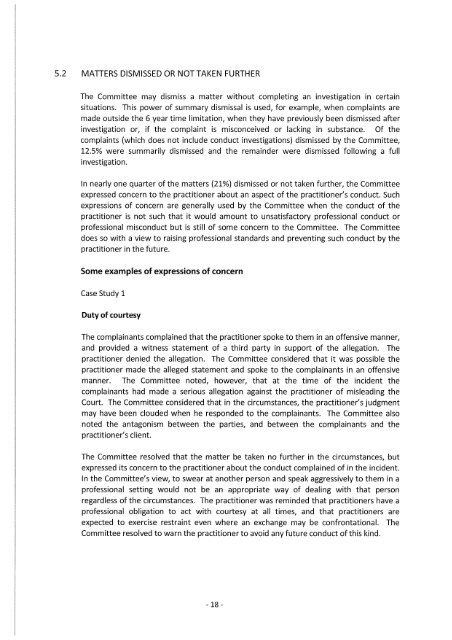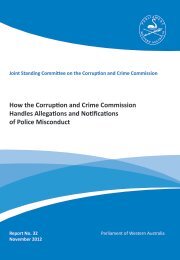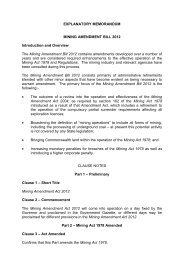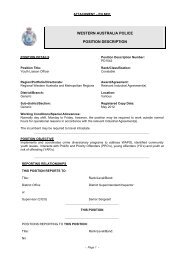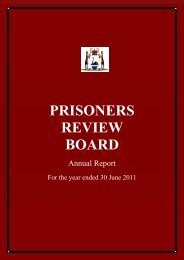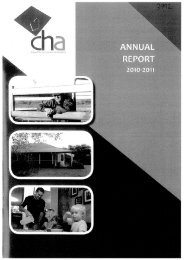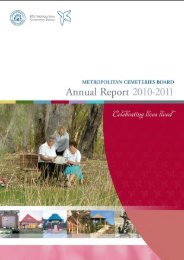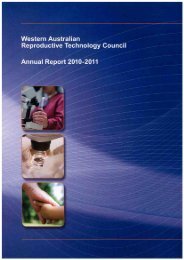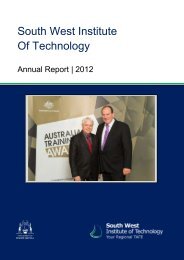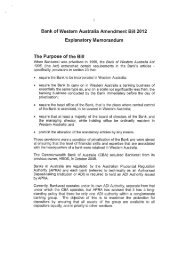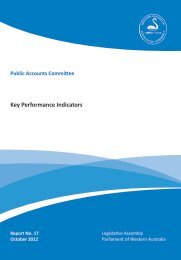Tabled Paper - Parliament of Western Australia
Tabled Paper - Parliament of Western Australia
Tabled Paper - Parliament of Western Australia
You also want an ePaper? Increase the reach of your titles
YUMPU automatically turns print PDFs into web optimized ePapers that Google loves.
5.2 MATTERS DISMISSED OR NOT TAKEN FURTHER<br />
The Committee may dismiss a matter without completing an investigation in certain<br />
situations. This power <strong>of</strong> summary dismissal is used, for example, when complaints are<br />
made outside the 6 year time limitation, when they have previously been dismissed after<br />
investigation or, if the complaint is misconceived or lacking in substance. Of the<br />
complaints (which does not include conduct investigations) dismissed by the Committee,<br />
12.5% were summarily dismissed and the remainder were dismissed following a full<br />
investigation.<br />
In nearly one quarter <strong>of</strong> the matters (21%) dismissed or not taken further, the Committee<br />
expressed concern to the practitioner about an aspect <strong>of</strong> the practitioner's conduct. Such<br />
expressions <strong>of</strong> concern are generally used by the Committee when the conduct <strong>of</strong> the<br />
practitioner is not such that it would amount to unsatisfactory pr<strong>of</strong>essional conduct or<br />
pr<strong>of</strong>essional misconduct but is still <strong>of</strong> some concern to the Committee. The Committee<br />
does so with a view to raising pr<strong>of</strong>essional standards and preventing such conduct by the<br />
practitioner in the future.<br />
Some examples <strong>of</strong> expressions <strong>of</strong> concern<br />
Case Study 1<br />
Duty <strong>of</strong> courtesy<br />
The complainants complained that the practitioner spoke to them in an <strong>of</strong>fensive manner,<br />
and provided a witness statement <strong>of</strong> a third party in support <strong>of</strong> the allegation. The<br />
practitioner denied the allegation. The Committee considered that it was possible the<br />
practitioner made the alleged statement and spoke to the complainants in an <strong>of</strong>fensive<br />
manner. The Committee noted, however, that at the time <strong>of</strong> the incident the<br />
complainants had made a serious allegation against the practitioner <strong>of</strong> misleading the<br />
Court. The Committee considered that in the circumstances, the practitioner's judgment<br />
may have been clouded when he responded to the complainants. The Committee also<br />
noted the antagonism between the parties, and between the complainants and the<br />
practitioner's client.<br />
The Committee resolved that the matter be taken no further in the circumstances, but<br />
expressed its concern to the practitioner about the conduct complained <strong>of</strong> in the incident.<br />
In the Committee's view, to swear at another person and speak aggressively to them in a<br />
pr<strong>of</strong>essional setting would not be an appropriate way <strong>of</strong> dealing with that person<br />
regardless <strong>of</strong> the circumstances. The practitioner was reminded that practitioners have a<br />
pr<strong>of</strong>essional obligation to act with courtesy at all times, and that practitioners are<br />
expected to exercise restraint even where an exchange may be confrontational. The<br />
Committee resolved to warn the practitioner to avoid any future conduct <strong>of</strong> this kind.


